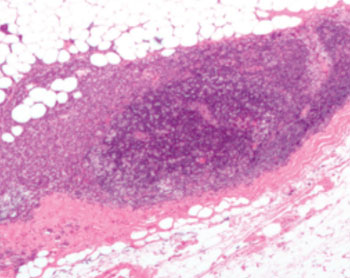Antiangiogenic Drug Blocks Breast Cancer Metastasis in Mouse Models
By LabMedica International staff writers
Posted on 25 Jun 2015
Cancer researchers have identified a potential drug target in preclinical studies that by being blocked prevented breast cancer metastasis in several mouse models.Posted on 25 Jun 2015
Investigators at Lund University (Sweden) worked with multiple mouse models of breast cancer as well as analyzing tumor samples from 768 patients in a population-based, nested case-control study. Results were combined with breast cancer gene-expression data from The Cancer Genome Atlas (Bethesda, MD, USA), a comprehensive and coordinated effort to accelerate the understanding of the molecular basis of cancer through the application of genome analysis technologies, including large-scale genome sequencing.

Image: Micrograph showing a lymph node invaded by ductal breast carcinoma and with extranodal extension of tumor. The dark purple (center) is lymphocytes (part of a normal lymph node). Surrounding the lymphocytes and extending into the surrounding fat (top of image) is ductal breast carcinoma (Photo courtesy of Wikimedia Commons).
The combination of a computational biology approach with mechanism-based preclinical trials described in a paper published in the June 15, 2015, issue of the journal Cancer Research enabled the investigators to identify inhibitors of activin-like receptor kinase (ALK) 1 as effective agents for blocking formation of new blood vessels and metastasis in breast cancer. Pharmacologic targeting of ALK1 with the drug dalantercept provided long-term therapeutic benefit in mouse models of mammary carcinoma, accompanied by strikingly reduced metastatic colonization as a monotherapy or in combination with the chemotherapeutic drug docetaxel.
Dalantercept is a novel antiangiogenic agent, which is a soluble form of ALK1, and acts as a ligand trap for the bone morphogenetic proteins BMP 9 and BMP 10, inhibiting their interaction with ALK1.
Gene-expression analysis of breast cancer specimens from a population-based nested case–control study encompassing 768 subjects defined endothelial expression of ALK1 as an independent and highly specific indicator of metastatic potential. ALK1 expression correlated with the expression of well-known endothelial markers, and higher levels of ALK1 expression were an independent prognostic factor for poor survival in breast cancer patients.
Senior author Dr. Kristian Pietras, professor of molecular medicine at Lund University, said, "We are investigating the role of ALK1 protein expressed by endothelial cells in promoting metastatic dissemination from primary breast tumors. Our results suggest that the presence of high levels of ALK1 in the breast tumor vasculature is a prognostic biomarker for metastatic disease. Moreover, our work encourages clinical testing of drugs blocking ALK1 in breast cancer with prevention of metastatic dissemination as the primary outcome. We are currently performing therapeutic studies with dalantercept in models of breast cancer in order to pinpoint the precise therapeutic regimen and disease stage at which the treatment is the most effective."
Related Links:
Lund University
The Cancer Genome Atlas













